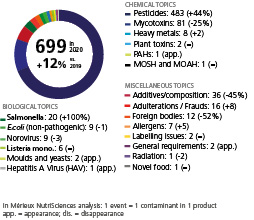Fruits & Vegetables
Fruits and vegetables are rich in vitamins and essential for a healthy diet. Whether consumed fresh or processed, they should be served at most meals.
Fruit and vegetables and cereals alone constitute the vast majority of a healthy and balanced diet.
The issues on safety and quality must be managed throughout the supply chain to ensure safe and quality products that meet consumers’ needs (conventional, organic farming, integrated farming, zero-residue, etc.). To cope with such a rapidly evolving market, manufacturers must be able to rely on accredited laboratories to ensure the quality and safety of their products.
Fruits and Vegetables – Safety and Quality of the products
In 2020, according to Safety HUD and based on the RASFF data, 699 events were notified. This number increased by 12% compared to 2019.
The main source of the overall events are linked to chemical contaminants. Among them:
- Pesticides were the first cause (483 events in 2020, increasing by 44% vs 2019).
- Mycotoxins were the second source




